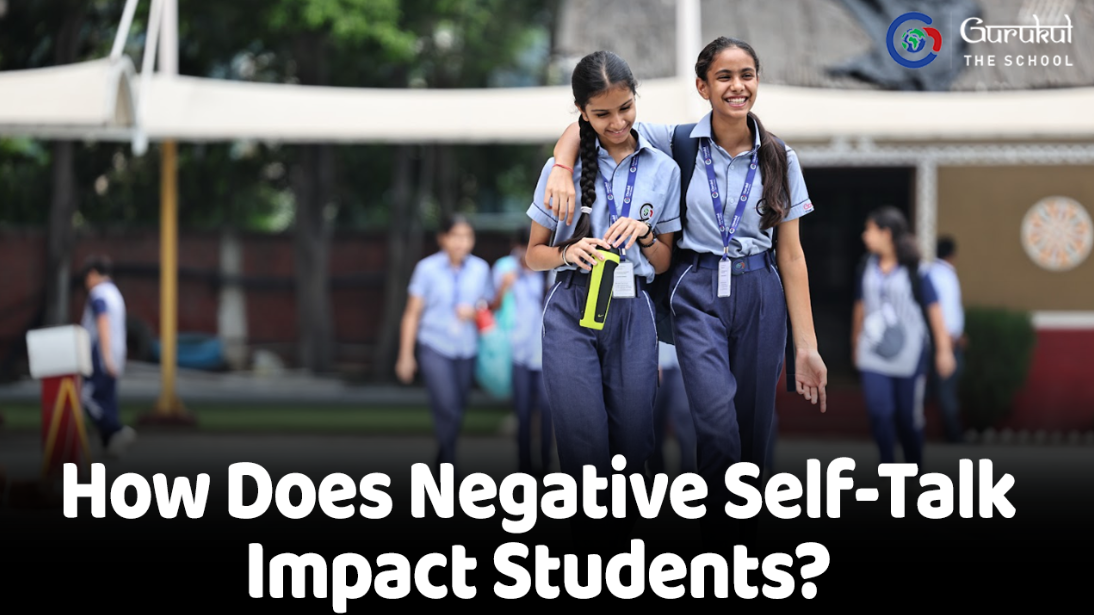How Does Negative Self-Talk Impact Students?
posted on Oct 15, 2025
If you’re a student appearing for your annual exam or conducting your first independent research as a part of your school project, there are chances that your inner voice might tell you that ‘I’m not prepared well for this test’ or ‘I’m not good enough at this.’ If this is so, we understand how you feel. But trust us, this voice in your head isn’t you being dramatic; it’s negative self-talk at play. Unfortunately, it’s way more powerful than what most people think. While occasional self-doubt i

If you’re a student appearing for your annual exam or conducting your first independent research as a part of your school project, there are chances that your inner voice might tell you that ‘I’m not prepared well for this test’ or ‘I’m not good enough at this.’ If this is so, we understand how you feel. But trust us, this voice in your head isn’t you being dramatic; it’s negative self-talk at play.
Unfortunately, it’s way more powerful than what most people think. While occasional self-doubt is normal, persistent negative self-talk can create a mental pattern that affects every area of your life. As students, you face constant evaluations during presentations, examinations, social situations, etc. It is during these moments that how you speak to yourself determines the outcome.
In this blog post today, we at Gurukul The School, a best school in ghaziabad, have shared how negative self-talk impacts students so you can better understand its extent and prevent it from blocking your life’s progress and achievements. Let’s start by exploring its direct impacts listed below.
-
It May Crush Your Academic Performance
Telling yourself things like “I’m not smart enough” or “I’ll never get this” doesn’t just reflect self-doubt. In fact, it also actively impacts your ability to learn. This kind of negative self-talk can interfere with your focus, making it harder to pay attention in class, retain information while studying, or recall it during exams.
When your mind is caught up in self-criticism, it has less space to process and absorb new ideas. Over time, this creates a frustrating loop: the more you doubt yourself, the harder learning becomes, and the more those doubts feel justified. But the truth is, it’s not your ability that’s holding you back—it’s the way you’re speaking to yourself.
-
It May Trigger Test Anxiety and Create Performance Blocks
We have seen that many students tend to experience intense panic right before an exam begins. Such a panic isn’t generally sudden, but a result of the constant negative self-talk you had a few days or weeks before the examination. If you repeatedly tell yourself, ‘I’m going to fail this test,’ or ‘I’m not prepared enough to clear this exam,’ then your body will respond as if that failure is already happening. Your brain will trigger stress responses, making it genuinely harder to perform.
During the actual exam, your negative self-talk can cause complete mental blocks, making the information you studied suddenly unreachable. So, even though you might know the material perfectly, your inner critic will jam the signal between your memory and your ability to express what you already know. This is one of the key reasons why we at Gurukul The School always advise our students to think positively, especially before exams, as it works like a charm to achieve the good results they deserve.
-
It Damages Your Motivation and Creates Procrastination
Will you start an assignment if you’re already convinced that it’s going to be terrible anyway? Most won’t. Negative self-talk is one of the biggest motivation killers students face. When your inner voice constantly predicts failure or criticises your efforts before you even begin, starting work feels pointless or even painful.
It often manifests as procrastination. Not because you’re lazy, but because your brain is trying to protect you from the negative emotions your self-talk has created around the task.
As a result, you may distract yourself with social media, suddenly feel exhausted, or pick up any activity to avoid facing something that your inner critic has already decided you’ll fail at. Unfortunately, this avoidance will ultimately create the exact outcome you feared.
-
It Undermines Your Confidence and Self-Esteem
One of the most damaging things negative self-talk does to students is bring down their confidence and self-esteem. Having said that, we understand that students’ lives are filled with situations in which they’re evaluated and compared to others. However, if negative self-talk becomes your default setting in these moments, it will systematically erode your self-confidence.
You will start doubting your abilities, even in areas where you previously felt competent. This erosion of self-esteem will eventually affect how you participate in class, whether you ask questions when confused, and how you handle constructive criticism.
Some may also start avoiding opportunities, such as joining clubs, trying new subjects, or taking on leadership roles, because their negative self-talk has convinced them that they’re not good enough. Over time, it can limit your growth and prevent you from discovering your actual potential.
Conclusion
We at Gurukul The School, a best school in ghaziabad, have seen that negative self-talk is way more common in students, but it’s not talked about enough. While some people may see it as pessimism, it’s an active force that shapes one’s performance, mental health, and overall life experiences. From blocking one’s ability to learn and perform, to destroying motivation, its impact can become really damaging for students.
However, you can very well avoid its negative impacts by learning to recognise the patterns of negative self-talk and taking conscious steps to replace it with a positive thought. It will take time, but once you’ve learned to identify negative self-talk and replace it immediately with positive self-talk, you will start seeing excellent results in every area of your life.